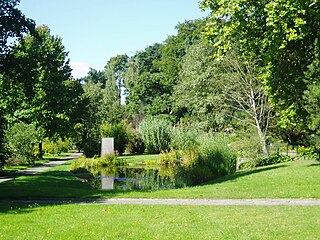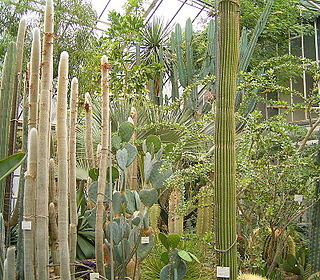
The Botanischer Garten der Universität Würzburg is a botanical garden maintained by the University of Würzburg. It is located at Julius-von-Sachs-Platz 4, Würzburg, Bavaria, Germany, and open daily; admission is free.

The Botanischer Garten der Universität Regensburg is a botanical garden maintained by the University of Regensburg on campus at Universitätsstraße 31, Regensburg, Bavaria, Germany. It comprises 4.5 hectares. The garden is open daily except Saturday in the warmer months.

The Old Botanical Garden of Göttingen University, with an area of 4.5 hectares, is an historic botanical garden maintained by the University of Göttingen. It is located in the Altstadt at Untere Karspüle 1, adjacent to the city wall, Göttingen, Lower Saxony, Germany, and open daily.

The Botanischer Garten Jena is the second oldest botanical garden in Germany, maintained by the University of Jena and located at Fürstengraben 26, Jena, Thuringia, Germany. It is open daily; an admission fee is charged.

The Botanischer Garten Karlsruhe is a municipal botanical garden located in Karlsruhe, Baden-Württemberg, Germany. This garden should not be confused with the nearby Botanischer Garten der Universität Karlsruhe operated by the University of Karlsruhe.

The Botanischer Garten der Johannes Gutenberg-Universität Mainz, also known as the Botanischer Garten Mainz, is an arboretum and botanical garden maintained by the University of Mainz. It is located on the university campus at Franz von Bentzel-Weg 9, Mainz, Rhineland-Palatinate, Germany, and open daily.

As of April 1, 2016 the garden has closed.

The Botanical Garden of TU Darmstadt is a botanical garden maintained by the Technische Universität Darmstadt.

The Botanischer Garten der Technischen Universität Dresden, also known as the Botanischer Garten Dresden or Dresden Botanical Garden, is a botanical garden maintained by the Dresden University of Technology. It is located in the north-west section of the Großer Garten at Stübelallee 2, Dresden, Saxony, Germany. It is open daily without charge.

Greifswald Botanical Garden and Arboretum, was founded in 1763. It is one of the oldest botanical gardens in Germany, and one of the oldest scientific gardens in the world. It is associated with the University of Greifswald in Greifswald, Germany.

The Botanischer Garten Münster is a botanical garden maintained by the University of Münster.

The Botanischer Garten Gießen, more formally the Botanischer Garten der Justus-Liebig-Universität Gießen, is a historic botanical garden maintained by the University of Giessen. It is the oldest botanical garden in Germany still at its original site, with an entrance at Senckenbergstraße 6, Gießen, Hesse, Germany. It is open daily without charge.

The Botanical Garden in Potsdam, is a botanical garden and arboretum maintained by the University of Potsdam. It has a total area of 8.5 hectares, of which 5 hectares are open to the public, and is located immediately southwest of the Orangery Palace at Maulbeerallee 2, Potsdam, in the German state of Brandenburg. It is open daily; an admission fee is charged for the glasshouses only (2017).

The Botanischer Garten der Universität Heidelberg, also known as the Botanischer Garten Heidelberg, is a botanical garden maintained by the University of Heidelberg. It is located at Im Neuenheimer Feld 340, New Campus, Heidelberg, Baden-Württemberg, Germany; portions are open to the public daily except Saturday without charge.

The Botanischer Garten der Christian-Albrechts-Universität zu Kiel, or less formally the Botanischer Garten Kiel, is a botanical garden and arboretum maintained by the University of Kiel. It is located at Am Botanischen Garten 1, Kiel, Schleswig-Holstein, Germany, and open daily.

The Botanischer Garten Düsseldorf, also known as the Botanischer Garten der Heinrich-Heine-Universität Düsseldorf and the Botanischer Garten der Universität Düsseldorf, is a botanical garden of 8 hectares maintained by the University of Düsseldorf. It is located at Universitätsstraße 1, Düsseldorf, North Rhine-Westphalia, Germany, and open daily in the warmer months; admission is free.

The Botanischer Garten der Universität Duisburg-Essen (4,100 square metres is a botanical garden maintained on the Essen campus of the University of Duisburg-Essen, North Rhine-Westphalia, Germany. It formerly was located at Henri-Dunant-Strasse 65. Now it is located next to the Grugapark area at Kühlshammerweg 30. The garden is maintained for research and educational uses, and is not open to the public.

The Botanische Gärten der Friedrich-Wilhelms-Universität Bonn, also known as the Botanischer Garten Bonn, is a botanical garden and arboretum maintained by the University of Bonn. It is located at Meckenheimer Allee 171, Bonn, North Rhine-Westphalia, Germany, and open except Saturdays in the warmer months; admission is free on weekdays.

The Ökologisch-Botanischer Garten der Universität Bayreuth is a botanical garden maintained by the University of Bayreuth. It is located at Universitätsstraße 30, Bayreuth, Bavaria, Germany, and open daily except Saturday.

The Faculty of Biology is one of the eleven faculties of the University of Freiburg in Freiburg im Breisgau, Baden-Württemberg, Germany. It is part of a strong life sciences network including institutions such as the Max Planck Institute of Immunobiology and Epigenetics, the Bernstein Center Freiburg (BCF), the Center for Applied Biosciences and the Center for Biological Systems Analysis, which started operations in 2008 as offspring of the Freiburg Initiative for Systems Biology (FRISYS), funded by the Federal Ministry of Education and Research (BMBF).






















